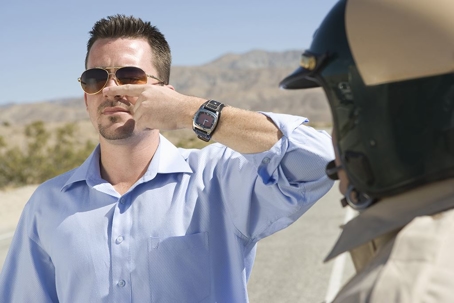Arizona drivers have the right to refuse a field sobriety test (FST), although this refusal may lead to arrest on suspicion of DUI (driving under the influence). Additionally, prosecution uses this refusal against you if your case goes to court, typically claiming your refusal proves you feared failing the test. However, these factors do not negate the fact that submitting to an FST is a bad idea, even if you are not driving under the influence of drugs or alcohol. The tests have a high failure rate and are so subjective that even non-impaired drivers fail them. Unfortunately, these facts do not stop prosecutors from using these test results against you.
What is a Field Sobriety Test?
If an officer pulls you over on suspicion of DUI, he or she may ask you to submit to a field sobriety test. You may refuse this request (politely, please) in the state of Arizona, as it is not mandatory. There are three standard FSTs:
- HGN, or Horizontal Gaze Nystagmus
- Walk and Turn
- One-Leg Stand
HGN test the driver’s ability to follow a focal point, usually a pen, using only his or her eyes. Walk and turn is exactly what it sounds like: take nine steps while walking a straight line, turn, and walk back. The final test involves standing on one leg for 30 seconds. The arresting officer nearly always presents the results of these tests in court.
Officers may issue non-standard tests such as reciting the alphabet backward, but those tests rarely play a role in court proceedings.
The Reality of Field Sobriety Tests
Upon suspicion of a DUI, the officer typically assumes your guilt before asking you to take a field sobriety test. The FST provides corroboration of this assumption; it does not settle the question of whether you drove while impaired. This supposition may explain the reason even unimpaired drivers frequently fail FSTs, as it is up to the arresting officer’s judgment whether you pass the test.
It may seem impossible, but even the handheld breathalyzers used in the field are unreliable. The unreliability of these tests is why we highly encourage our clients to refuse them and instead take a chemical test at the police station.
Refusing to Take a Field Sobriety Test
We understand that refusing to cooperate with the police is a scary prospect. Realize that you are not refusing to cooperate but instead, you are exercising your rights. Arizona law dictates only that you provide your name, driver’s license, registration, and proof of insurance. To every other question, you may safely respond that, under advisement, you choose not to answer. Do so politely and remember that anything you say is usable in court against you.
If you follow these instructions, you likely face arrest. At that time, the officer asks you to take a chemical test. This involves a breathalyzer, urine, or blood test, with the breathalyzer being the most common option. These tests are far more accurate than the field tests. Arizona law allows you to refuse the chemical test as well, but we advise against this. Refusal comes with an immediate revocation of your driver’s license for a minimum 12-month period. Additionally, the arresting officer typically obtains a search warrant, allowing him or her to force you to take the chemical test anyway.
Hire an Arizona DUI Attorney
If you face DUI charges, hire a DUI attorney immediately. The team Edwards & Petersen is experienced in representing Arizona clients charged with DUI. We can advise you on the viability of your case and explain the charges facing you.

